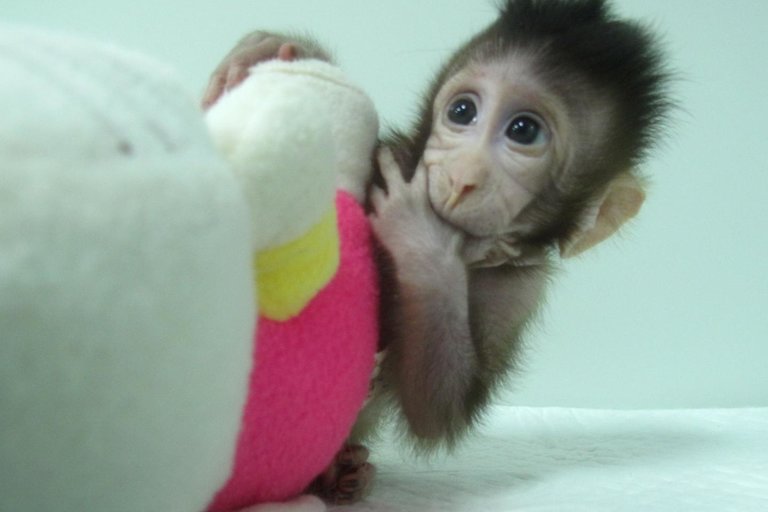 |
| This is a photograph of Zhong Zhong, one of the first two monkeys created by somatic cell nuclear transfer. |
According to a new paper in the journal Cell, the procedure will it make possible for labs to decant large populations of genetically uniform monkeys, which could open up entirely new areas for medical research.
The long-tail macaques, named Zhong Zhong and Hua Hua, were born six and eight weeks ago, respectively. While the monkeys are not the first primates to be cloned — others have been created using a simpler process called embryo splitting — they are the first to ever survive the somatic cell nuclear transfer (SCNT) process. The advantage to this technique, researchers say, is that greater numbers of genetically identical clones can be created in a single batch. This allows geneticists to make isolated changes in the genetic code, then study outcomes among a large population.
“There are a lot of questions about primate biology that can be studied by having this additional model,” said senior author Qiang Sun, director of the Nonhuman Primate Research Facility at the Chinese Academy of Sciences Institute of Neuroscience, in a statement issued with the publication of the new research. "You can produce cloned monkeys with the same genetic background except the gene you manipulated. This will generate real models not just for genetically based brain diseases, but also cancer, immune, or metabolic disorders and allow us to test the efficacy of the drugs for these conditions before clinical use."
 |
| This is a photograph of Hua Hua, one of the first monkey clones made by somatic cell nuclear transfer. |
By comparison, the embryo splitting technique — the one that had been previously used with monkeys — is essentially an artificial approximation of how natural twins develop in mammals. Embryo splitting can only generate up to four offspring at a time, while SCNT clones are theoretically limitless.
In either case, cloned egg cells are placed within surrogate female monkey moms, where the embryos develop and are born naturally.
The research team had previously tried to use adult donor cells with the SCNT method, but the cloned macaques died a few hours after birth. Earlier research established that, for reasons that are still unclear, monkey cell nuclei are more resistant to the SCNT process than other mammals, such as mice and cows.
"We tried several different methods, but only one worked," said Sun. "There was much failure before we found a way to successfully clone a monkey."
The researchers plan to continue improving the technique and generating more macaque clones, using international guidelines for animal research set by the US National Institutes of Health.
“We are very aware that future research using non-human primates anywhere in the world depends on scientists following very strict ethical standards,” said Muming Poo, a co-author of the study.
Read more at Seeker
No comments:
Post a Comment